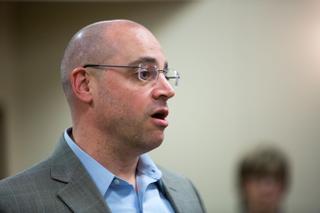Spotlight PA is an independent, nonpartisan newsroom powered by The Philadelphia Inquirer in partnership with the Pittsburgh Post-Gazette and PennLive/The Patriot-News. Sign up for our free weekly newsletter.
For months beginning in late 2018, parents in one of the Boy Scout troops in York County exchanged emails raising an alarming complaint: Applications for a series of required background checks for some of the troop’s volunteers were missing.
At least one of them — a scoutmaster who had attended an overnight trip — did not have up-to-date clearances on file at all, according to the emails, which were obtained by The York Dispatch and Spotlight PA.
“We have several active leaders (6) overseeing the activities and protection of our troop who require formal clarification of their standing as it relates to their clearances to do so,” parents of a scout in one of the York troops wrote in September of that year.
A committee chair for the troop later responded to the concerns, writing, “I am incredibly disturbed by this situation.”
In response to the devastating Penn State child sexual abuse scandal, the state Legislature passed landmark reforms that, as of 2015, required anyone working with children — including volunteers — to undergo a series of background checks.
The goal was to prevent those with certain criminal records or a history of abuse from gaining access to minors through youth programs.
Now, five years after the law took effect, there are signs it isn’t working as intended, and organizations are able to skirt the rules and face few, if any, consequences, according to a two-month review by the news organizations.
For groups such as the Boy Scouts and others that are not already regulated by the state, there is no official oversight of whether they are complying with the law, and problems only become apparent if someone complains or a child is harmed. That makes it impossible to know how many groups may be falling short of the requirements.
The problems extend beyond York County. Documents obtained under a public records request show complaints to the Department of Human Services from all corners alleging volunteers lack clearances.
Violations can be prosecuted by local district attorneys, but none have brought such a case since the law took effect, according to state court records.
“Is this an issue? A hundred percent,” York County District Attorney Dave Sunday said in an interview. “Is this something that needs to be worked through and figured out, and do people need to be held accountable? Yes.”
The law requires anyone working with children in the public, private or nonprofit sector, including volunteers, to undergo a criminal background check by the State Police and a child abuse clearance by the Department of Welfare. Some are also required to get a third check by the FBI. The clearances are good for 60 months and must be on file with the organization before volunteers start their work.
The mandate was hailed as a major step forward in protecting children, and few question the value of it. But, as those in York County and elsewhere have found, its effectiveness relies on trust — not actual enforcement.
“There is a good-faith presumption written directly in [the law] that these groups are required to obtain and maintain clearances,” said Amy Grippi, the executive director of child services for the human services department.
Grippi said entities already regulated by the state, such as daycares and residential homes for children, are regularly checked to ensure they are properly collecting and keeping clearances on file as part of annual inspections.
But overseeing other private and nonprofit groups that are not already subject to state oversight would be a major undertaking and require more resources.
“There are probably thousands of such programs and services,” said Grippi, adding that one line of defense for parents concerned about their child’s safety is to directly ask youth groups about their policies on clearances.

LOST APPLICATIONS
The emails obtained by the news organizations show that was the case last year with the Boy Scouts’ New Birth of Freedom Council, which covers portions of south-central Pennsylvania, including the York region.
The council has 9,000 youth members and has more than 3,500 registered adult volunteers.
The emails describe how clearance applications, which contain sensitive information such as Social Security numbers, for the York-based troop had been lost or misplaced, and how volunteers had overseen children without clearances on file.
The documents show at least three people with leadership positions in the York County troop contacted the New Birth of Freedom Council’s top staff to report missing clearances and volunteers who should never have been able to attend trips.
Ron Gardner, the CEO of the New Birth of Freedom Council, responded to one of the emails saying he was unhappy about the situation.
Other emails from early 2019 assert that one scoutmaster went on a two-day overnight trip, even though some of his clearances had expired. And in an email just this month, a York-based troop member complained that one of its leaders had attended a two-day camp last summer thinking his clearances were on file, when, in fact, New Birth of Freedom Council officials had no record of them.
» WE DEPEND ON YOU to help pay for future investigations by Spotlight PA that hold the powerful in Pennsylvania to account. Donate now and support our team of journalists in the state capital.
In an interview in November, Gardner acknowledged that keeping track of clearance applications after the requirement took effect in 2015 had been difficult, and that the Council initially dedicated more resources to stay on top of them.
He also said he was not aware of problems where clearance applications had been lost, potentially allowing for volunteers to go on trips without them on file.
When sent follow-up questions citing the email chains supplied to the news organizations, Gardner confirmed that a troop leader did, in fact, not have clearances on file when he participated in an overnight trip. He said the council warned the troop leader prior to the trip that his clearance was expiring, and that the clearance has since been obtained.
Gardner said in a statement that the safety of troops is paramount, and that the Boy Scouts of America employs “a multi-layered process of safeguards that serve as barriers to abuse” that, in addition to background checks, includes training and other programs.
Gardner also said individual troops share the responsibility of ensuring clearances are appropriately maintained. Unit leaders themselves are volunteers.
“At the unit level, it is the responsibility of the unit committee chair and chartered organization representative to ensure that compliance is handled before the individual can begin volunteering,” he said.
Gardner declined to answer specific questions about whether he had been notified by troop leaders about clearances that were not on file. He also declined to say whether he had met with the leaders to address the issues.
MORE COMPLAINTS
Concern over who is monitoring to ensure backgrounds checks are completed extends statewide. The Department of Human Services received at least five complaints in 2019 about volunteers allegedly lacking proper clearances, according to records released under the Right to Know law.
One was from an administrative assistant in Allegheny County who processes summer camp referrals for foster children in the county’s care. Another was from a Philadelphia resident who had children involved in sports.
A third was from a retired county detective who had investigated crimes against children. In a May 12 email last year, he wrote: “I am very concerned that youth programs do not take the required clearances seriously.”
In almost every instance, the department did not intervene, instead telling them to either address it directly with the organization, contact the organization’s insurance carrier — which often requires them to properly maintain clearances — or report the organization to the local district attorney’s office.
In one candid response, a state Human Services department employee wrote: “We find that the area of enforcing this law (especially as it pertains to clearances) is one which requires strengthening.”
The employee added: “Some of the difficulty is that the PSP [Pennsylvania State Police] and/or the District Attorney may not have the time or resources to charge a person or agency in a case such as this and therefore the law continues to be broken.”
Sunday, York County’s district attorney, said the state should implement a clear and confidential way to report non-compliance, and also require that it be reported to police. But even when complaints are filed, they rarely prompt action.
So far, no one has been prosecuted for violating the law, according to data maintained by the Administrative Office of Pennsylvania Courts.
Bucks County District Attorney Matt Weintraub said it would be difficult to successfully prosecute someone under the law as written because it states that an employer’s failure to get clearances from staffers or volunteers is a crime if it is “intentional.”
“There has to be willful violation of the law,” he said, adding that a prosecutor would have to pitch the equivalent of “a perfect game” to win.
Time and resources are also a factor, said Tom Hogan, who retired last month as Chester County’s District Attorney after completing two terms. New laws enacted after the Penn State scandal “exponentially increased” prosecutors’ workloads, Hogan said.
Complaints about clearances, he said, can get “dropped further down the list of priorities.”
“You have to take care of the biggest forest fire first, and the candle burning in the corner … gets less attention,” Hogan said.
Spotlight PA receives funding from nonprofit institutions and readers like you who are committed to investigative journalism that gets results. Become a donor today at spotlightpa.org.
